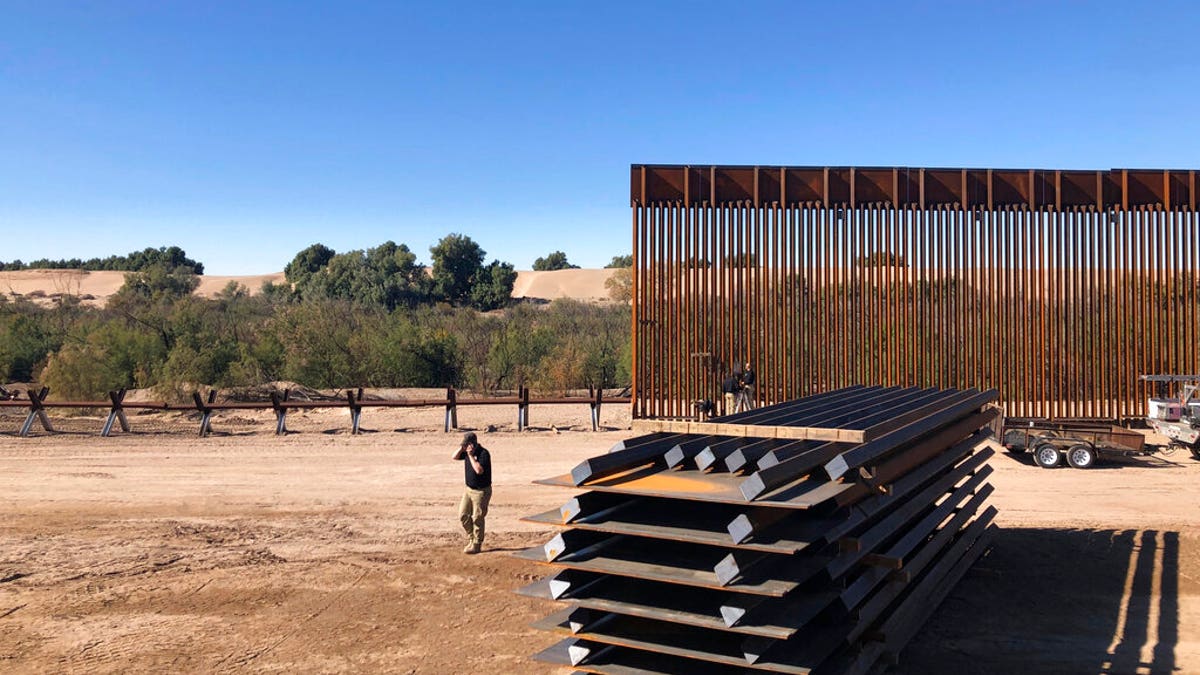Trump says he, not governors, has power to reopen US economy
Wall Street Journal associate editor John Bussey on who has the power to reopen states after coronavirus lockdown.
Get all the latest news on coronavirus and more delivered daily to your inbox. Sign up here.
Hundreds of construction workers employed to build President Trump’s border wall are passing through small towns in Arizona and New Mexico despite stay-at-home orders meant to curb the spread of the coronavirus.
In mid-March, shortly after Trump declared a national emergency amid the pandemic, Customs and Border Protection (CBP) announced plans to build 150 miles of 30-foot high border fencing in Arizona, New Mexico and California, while continuing construction at 15 sites across those states and Texas.
So-called “man camps” are being erected in Arizona and New Mexico border towns to house construction workers coming to build the wall, leaving residents fearing out-of-towners may spread COVID-19 into their communities. Businesses that provide essential lodging for medical professionals and construction workers have been allowed to remain open amid statewide stay-at-home orders.
CLICK HERE FOR FULL CORONAVIRUS COVERAGE

In this Jan. 10, 2020, photo, people work at a portion of border wall which is under construction in Yuma, Ariz. Illegal border crossings have plummeted as the Trump administration has extended a policy to make asylum seekers wait in Mexico for court hearings in the U.S. (AP)
Many construction workers have chosen to make their temporary homes in Ajo, a town of more than 3,300 people in Pima County, Ariz., just 43 miles from the Mexican border, moving into trailer parks, hotels and rental houses.
“They are bringing people as far away as places like Nebraska and Montana,” Gail Emrick, executive director of the Southeast Arizona Area Health Education Center in Nogales, Ariz., told The Guardian. “It’s just bringing an irrational level of danger to these communities.”
Meanwhile, Army Corps of Engineers, which oversees construction contractors at the border, has said that operations are following all social distancing guidelines recommended by the Centers for Disease Control and Prevention.
Last week, 10 trailers were parked in a vacant lot in the historic town center in Columbus, a village in Luna County, New Mexico, sitting just three miles north of the Mexican border. The camp operated by Galveston, Texas-based construction contractor SLSCO will serve as two-year housing for a maximum of 40 workers, Las Cruces Sun-News reported.
It remained unclear when the workers were expected to move into the trailers. In a letter last week, Columbus Mayor Esequiel Salas asked SLSCO to hold off until April 16. Meanwhile, construction on the 30-foot high bollard steel fencing near the U.S.-Mexico border in Lunay County has continued.
BORDER WALL CONSTRUCTION SURPASSES 150 MILES: CBP
"We are a rural village and we are obviously concerned about an unnecessary build of the wall. That is not our priority when we have an epidemic," Helena Myers, a 30-year resident of Columbus, told the Sun-News. “The mayor thinks this is going to be commerce for the village, but this could be a detriment to our health."
Dozens of House and Senate Democrats on Wednesday called on the Trump administration to immediately halt its border project, arguing construction “places local communities at unnecessary risk," according to Politico.
The letter addressed to Attorney General William Barr, Defense Secretary Mark Esper and acting Homeland Security Secretary Chad Wolf said: “We should be using all resources and funding to combat this virus and protect Americans, instead of using critical funding and resources to continue the construction of a border wall."
Last month, a Customs and Border Protection official told Fox News that wall construction schedules have so far not been affected by the pandemic. Speaking at a campaign rally in South Carolina in February, before widespread social distancing measures were implemented across the country, President Trump said the Democrats’ open-border policies were dangerous at the onset of the coronavirus outbreak.
CLICK HERE TO GET THE FOX NEWS APP
At the time of the rally, the United States had just begun to see the effects of the coronavirus, with confirmed cases identified in clusters in northern California, Oregon and Washington state. Over the following two months, the U.S. would become the most-infected nation in the world, recording at least 639,664 confirmed cases by Thursday, according to Johns Hopkins University.
Meanwhile, Mexico recorded just 5,847 confirmed cases, with 449 deaths by Thursday. Critics suspect the number of cases is drastically underreported, accusing Mexican President López Obrador of failing to implement widespread testing for the general public.









































